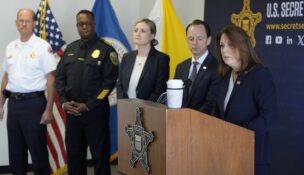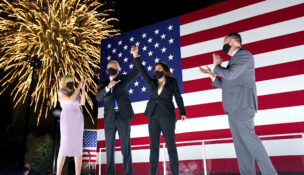State Supreme Court considers certiorari-triggering event in zoning lawsuit
By: Michaela Paukner, [email protected]//December 30, 2020//
State Supreme Court considers certiorari-triggering event in zoning lawsuit
By: Michaela Paukner, [email protected]//December 30, 2020//
In a lawsuit involving a Walworth County zoning ordinance, the Wisconsin Supreme Court considered what sorts of events can lead to a certiorari-review action.
Although five of the six participating justices reached the same decision in the case, the majority disagreed over the interpretation of a statute central to the question of when certiorari reviews should start.
The high court released its opinion in Gail Moreschi v. Village of Williams Bay and Town of Linn ETZ Zoning Board of Appeals on Wednesday.
The case involves Moreschi’s neighbors’ plans, in 2017, to build a new house and resulting need to go before the Linn Township’s board for a zoning variance. To have the request granted, the neighboring couple had to satisfy five conditions set out by a local zoning ordinance. Their plan was opposed by Moreschi, who argued the neighbors had several options that didn’t require a variance. Despite the objections, the board unanimously approved the neighbors’ request at the end of a hearing in May.
Moreschi then filed a writ of certiorari in the Walworth County Circuit Court. She alleged that the board had improperly granted the neighbors a variance because it had failed to find beyond a reasonable doubt that all five conditions of the zoning ordinance had been met.
At the board’s next meeting, in July 2017, it issued approved meeting minutes from the May hearing, which included factual findings not included in the draft minutes. It also signed a determination form that repeated the factual findings and included specific conclusions on each of the five zoning-ordinance conditions. The board submitted both to the circuit court in a certiorari record, and the court affirmed the decision to grant the variance.
Moreschi then appealed the circuit court’s decision on procedural and substantive grounds. She said the board had violated her due-process rights by having documents from July 2017 added to the certiorari record, and that the board had not explicitly found beyond a reasonable doubt that the requested variance met the five conditions set out in zoning ordinances.
A court of appeals rejected both claims, finding that the filing of the determination form had triggered certiorari review and the board’s findings on the five conditions were reasonable and supported by evidence.
Moreschi then brought the case to the Wisconsin Supreme Court and asked the justices to review three questions: whether the court of appeals had properly determined the triggering event for purposes of appealing the board’s decision on the writ of certiorari; whether Moreschi’s due-process rights had been violated; and whether the board had failed to follow the correct theory of law in granting the variance.
The majority affirmed the court of appeals’ decision, writing that the filing of the determination form triggered the review. That conclusion informed the court’s decision to reject Moreschi’s other two claims.
In deciding which filing gave rise to certiorari review, Justice Rebecca Dallet wrote that the meeting minutes were a tangible document, but the language of Wis. Stat. § 62.23(7)(e)10 suggested they were different than the filing of the decision. The statute allows an action seeking certiorari review “within 30 days after the filing of the decision in the office of the board of appeals.”
“In order to give meaning to every word in the statute, filing the minutes and filing the decision must refer to separate actions and separate documents,” Dallet wrote. “Therefore, the filing of the minutes does not trigger certiorari review.”
Justices Ann Walsh Bradley and Jill Karofsky agreed with Dallet’s interpretation of the statute, but Justice Annette Ziegler and Chief Justice Pat Roggensack disagreed in a concurring opinion. Ziegler wrote that the majority “inexplicably concludes” that meeting minutes may never serve as a triggering event.
“Notwithstanding the fact that they are separate actions, the filing of the minutes can serve as the filing of the decision if the minutes contain ‘the vote of each member upon each question,'” Ziegler wrote.
Despite the different interpretations, Ziegler and Roggensack reached the same conclusion as Dallet — the filing of the determination form was the triggering event in this case.
Justice Rebecca Bradley disagreed with the decision entirely, writing that the majority overlooked “unlawful and improper acts.” She said the board violated its own ordinance and then altered its minutes to add findings never made during the hearing.
“The majority gives the Board a free pass to disregard its own governing laws,” Bradley wrote. “I will not, and I therefore respectfully dissent.”
Bradley said she would have reversed the board’s decision and remanded the matter to the board.
Justice Brian Hagedorn did not participate in the decision. Follow @WLJReporter
Legal News
- With GOP convention over, Milwaukee weighs the benefits of hosting political rivals
- Congress to formally investigate Secret Service
- Milwaukee Police Department issues statement regarding video release policy
- GOP convention sets the stage for the Democratic convention in Chicago, activists and police say
- Survey: Harris has enough delegates to be nominee
- Outside the RNC, small Milwaukee businesses and their regulars tried to salvage a sluggish week
- Biden called to resign immediately after the president announces he won’t seek reelection
- Biden drops out of 2024 presidential race, endorses Harris
- Local PA cops allegedly thought Trump’s would-be assassin was Secret Service
- Biden-Lead Secret Service admits agency denied past requests by Trump’s campaign for tighter security
- Class action filed against Walgreens
- Former Waukesha County Sheriff’s Office lieutenant pleads guilty to smuggling contraband
Case Digests
- Ineffective Assistance of Counsel; Double Jeopardy; Sentencing
- Ineffective Assistance of Counsel; Sexual Assault-Prosecutorial Misconduct
- Contract-Negligence
- Criminal Law; Juvenile Law; Discovery
- Family Law; Child Support; Property Division First paragraph(s)
- Ineffective Assistance of Counsel- Exclusion of Evidence of Witness Bias
- Postconviction Relief-Sentencing-Ineffective Assistance of Counsel
- 14th Amendment – Due Process
- Criminal-Sentencing Guidelines – Enhancement
- Bankruptcy-Tax
- Civil Rights – 14th Amendment-Jury Instructions
- Contract; Foreclosure and Property











